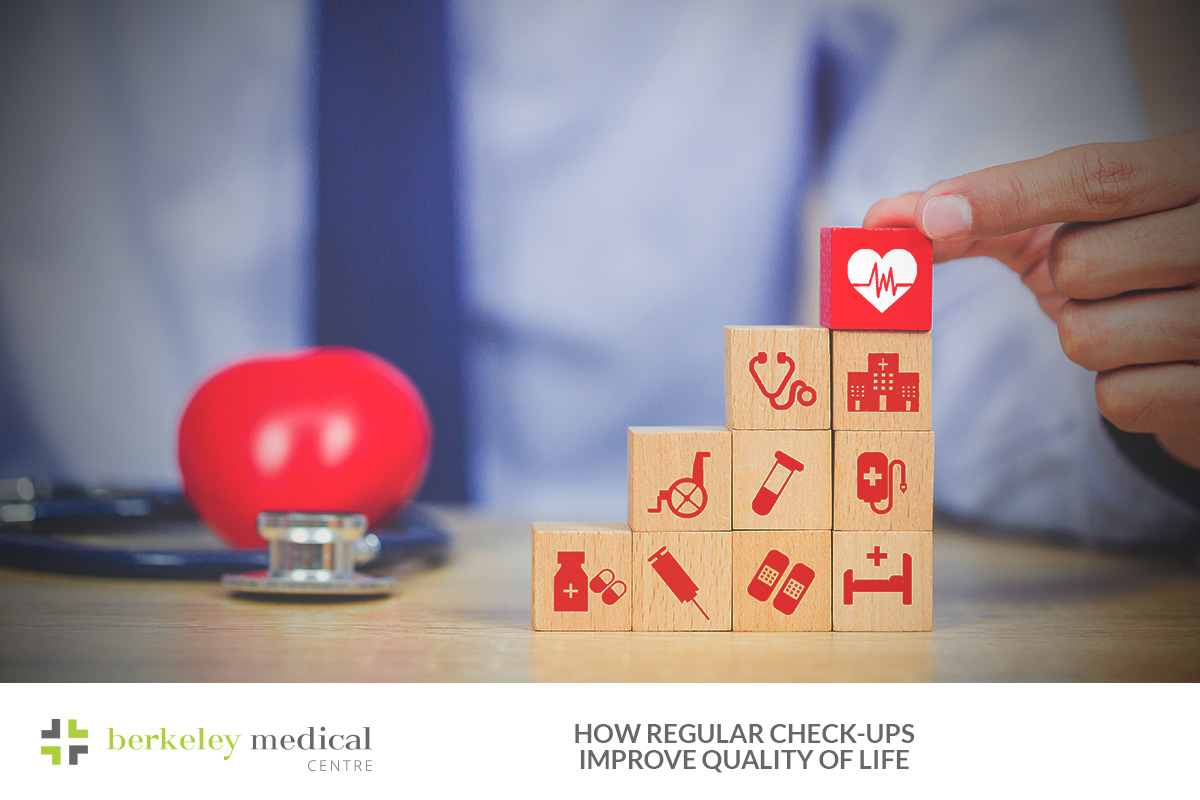Regular health check-ups play a crucial role in keeping you healthy and preventing potential problems before they become serious. At Berkeley Medical Center, we believe that proactive healthcare is the best way to ensure a long, healthy life. Many health conditions, like high blood pressure or diabetes, can go unnoticed for years without symptoms. This is why regular check-ups with your General Practitioner (GP) are essential to stay ahead of any issues.
In this guide, we will cover why regular check-ups are so important, what happens during these appointments, and how they can benefit you throughout your life.
Why Are Regular Check-Ups So Important?
Preventative healthcare is the key to staying healthy. By visiting your GP regularly, you can catch health problems early when they are easier to treat, manage ongoing conditions more effectively, and even prevent certain diseases from developing.
Here are the main reasons regular check-ups matter:
Early Detection of Health Issues
Many serious health problems, such as heart disease, diabetes, or high cholesterol, do not show symptoms right away. A check-up can detect these issues early through routine tests like blood pressure and cholesterol checks. Early detection allows for quicker treatment and better outcomes, potentially preventing more serious complications.
Managing Chronic Conditions
For those already living with conditions such as asthma, diabetes, or high blood pressure, regular check-ups are vital for keeping these conditions under control. Your GP can adjust medications, provide new treatments, and ensure that your management plan is still effective. Regular monitoring helps reduce the risk of complications.
Personalised Health Advice
Everyone’s health needs are different. Your GP can create a personalised health plan based on your medical history, lifestyle, and family risk factors. This could include specific screenings, advice on diet and exercise, or steps to reduce risks related to your age or genetics.
Prevention Through Screening and Vaccinations
Preventative care is not just about identifying problems—it is also about stopping them before they start. Your GP may recommend important health screenings, such as skin cancer checks (especially important in sunny regions like Queensland) or cervical cancer screenings for women. Additionally, staying up to date with vaccinations helps protect you from diseases like the flu, pneumonia, or, more recently, COVID-19.
What to Expect at a Regular Check-Up
If it is been a while since your last check-up, here’s what you can typically expect:
Health History Review
Your GP will ask about your medical history, current medications, and any recent health changes or concerns. They may also ask about your family medical history and lifestyle habits, such as your diet, exercise, and any smoking or drinking habits. This helps them assess your risk for conditions like heart disease or diabetes.
Physical Examination
Your GP will perform a basic physical exam to check vital signs like blood pressure, heart rate, and weight. They may also examine your lungs, heart, skin, and other areas, depending on your concerns or age.
Screenings and Tests
Depending on your age, medical history, and risk factors, your GP may recommend specific tests. Common tests include blood tests to check for high cholesterol, blood sugar levels (to detect diabetes), and other important health indicators. These tests can catch issues early, even before symptoms develop.
Health Advice and Follow-Up
At the end of your visit, your GP will discuss any test results or findings with you. They may provide advice on improving your health, such as changes to your diet, exercise routine, or stress management techniques. If any issues were detected, they will recommend next steps, which may include additional tests, treatments, or referrals to specialists.
Common Health Check-Ups by Age Group
Your health needs change as you age, and regular check-ups should reflect that. Here’s a general guide on what you should focus on at different stages of life:
Children and Adolescents
Regular check-ups for children are essential for tracking growth and development. These visits often include vaccinations, hearing and vision tests, and discussions about nutrition and physical activity. Your GP will also monitor for any behavioural or developmental concerns.
Adults (Ages 18-49)
For adults, check-ups focus on lifestyle risk factors, such as diet, exercise, and mental health. Blood pressure, cholesterol, and blood sugar should be regularly checked. Women should have regular cervical screenings (Pap tests), and men may want to discuss prostate health as they approach middle age.
Seniors (50 and Above)
As we age, the risk of certain health conditions increases. Seniors should have more frequent screenings for heart disease, diabetes, and cancer. Your GP may recommend tests such as bowel cancer screening, bone density tests for osteoporosis, and regular vaccinations for the flu and pneumonia. Cognitive health and mobility assessments also become important as part of overall well-being.
How Regular Check-Ups Benefit You
Regular check-ups provide numerous benefits for your long-term health, including:
- Early Detection of Illness: By catching health problems early, you can often treat them before they become more serious.
- Better Management of Chronic Conditions: If you have a long-term health condition, regular monitoring ensures that your treatment plan is still working and helps prevent complications.
- Improved Quality of Life: Preventative healthcare can lead to better outcomes, helping you feel healthier and more energetic throughout your life.
- Peace of Mind: Regular check-ups provide reassurance, giving you confidence that you’re on top of your health.
Conclusion
Regular health check-ups are a simple yet essential part of maintaining good health. They allow your GP to identify potential problems early, help you manage any ongoing health issues, and provide personalised advice that can improve your well-being. At Berkeley Medical Center, we are here to support you in staying healthy through every stage of life with professional, proactive care.







